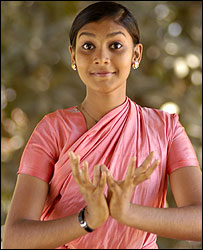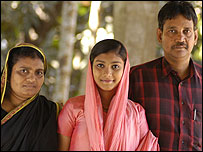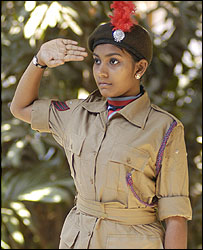|
By John Mary in Malappuram, Kerala
|


Rubiya has danced from the age of three (Pics: Ali Kovoor)
|
The family of a young Muslim girl in India's southern state of Kerala say they are being shunned by the local mosque committee (mahallu) because she is practising Indian classical dance.
VP Rubiya, 16, came first in Bharatnatyam, Kerala natanam and folk dance competitions at the recent Kerala School Festival.
She also won the dance competition at the Veeran Haji Memorial Higher Secondary School at Morayur in the Muslim-dominated district of Malappuram.
It was Rubiya's 27 points that helped her home district move up from seventh to fifth position at the state school festival.
Now she has an offer from the celebrated Indian dancer Mrinalini Sarabhai's dance academy, Darpana, her father Syed Alavikutty says.
'Outcasts'
The local mosque committee at Valluvambram, however, is not impressed by Rubiya's feats, says her father, a clerk with a travel agency.
"If she had won prizes in 'oppana' and 'mappila pattu' [traditional Muslim art forms], she would have been flooded with gifts by now. The mahallu leaders would never openly admit that it is her dance that makes them treat us as virtual outcasts," says Mr Alavikutty.
Rubiya, who started learning music and dance when she was three, is busy preparing for school examinations due next month. But she snatches time in between for stage performances at local temples.
 |
Rubiya was three years old when she began dancing

|
She has no choice because stage shows help her with some extra income to support her and her parents, as well as an elder brother and a younger sister.
"My fee ranges from 1,000 to 3,000 rupees ($22 to $66). I have performed at more than 50 temples," says Rubiya.
She has been fortunate to be trained by dance gurus like RLV Anand, who has never taken a rupee from her other than what she offers as gifts.
Both he and Bharatanjali Sasi, Rubiya's Kerala natanam dance teacher, even buy her costumes for her competitions.
"I'm confident that she will bring us laurels. That's all we need," says Mr Anand, extolling the virtues of the rare find from a community that still fights shy of classical dances.
Teachers' favourite
Rubiya is the darling of her teachers and friends at the Veeran Haji high school.
"God is one. When I pay ritualistic obeisance through mudras [hand signs], I am imploring not just the Hindu gods but the supreme creator, which we call by different names," she says.
It is the Hindu worship content in the classical dances that her family says has driven a chasm between her and conservative elements in the community.
KP Raihemath, a teacher who takes her to competitions, says there is nothing un-Islamic in Bharatnatyam dance.

Rubiya's parents have encouraged her to dance
|
"If she were my own daughter, I would still do the same."
Another teacher CP Sheena says Rubiya is a role model for her peers.
A class topper and a National Cadet Corps cadet, Rubiya has already scored 30 bonus marks which would enhance her exam scores and improve her chances of joining a professional course after secondary school.
At the moment, however, a professional degree is not what she wants to do.
"I will practice and excel as a classical dancer. My ambition is to do research in dance and contribute to society in my humble way," she says.
Membership of a particular mosque committee for Muslim families depends on where they live.
"If you are not a mahallu member, the kazi [priest] will not bless your child's marriage. Worse, you are even denied a slot in the local cemetery," said Mr Alavikutty, who has also dabbled in acting with a troupe in Kerala.
'Heavy price'
Rubiya's mother Amina says she does not regret sending her daughter to dance.
"But we had to pay a heavy price. I have even survived a bout of cancer only after well-wishers sent us money for treatment. But the parish leaders ensured that all official help bypassed us," she says, wiping her tears.

Rubiya has become a role model in school
|
"If I die today, where will my husband bury me? Would the parish endorse my daughter's marriage?"
Mohammed Unni Haji, secretary of the Valluvambram mosque committee, denies they are against Rubiya's dancing.
"We do not object to her artistic persuasions. If Rubiya and her family, living in a rented house, shift to a house on the road under our jurisdiction, we will admit them."
Local politician Nalakathu Asain says the mosque committee leaders are not speaking the truth.
"This talk about jurisdiction is an alibi. There are several families outside the Valluvambram jurisdiction that enjoy mahallu membership," he says.
Mr Alavikutty says that his cousins who live outside Valluvambram are members of the mosque committee.
But the family is not deterred by this.
